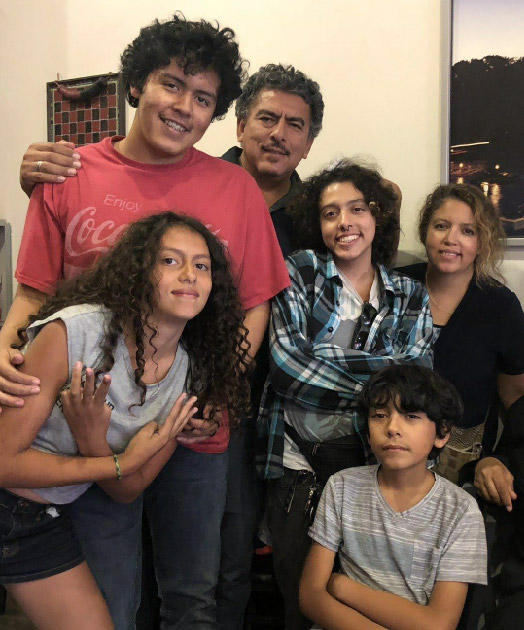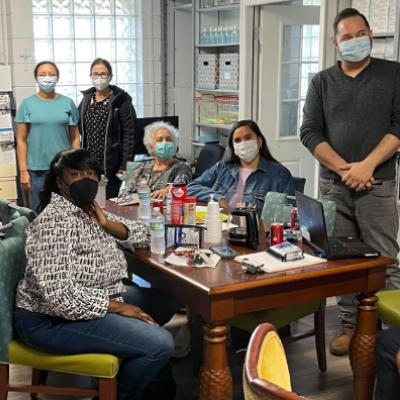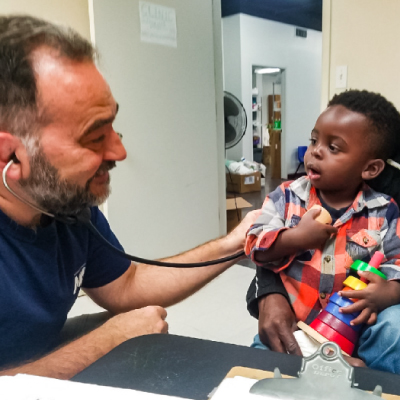- Who We Are
- Clinician Employment
- Publications
- Witness to Witness (W2W)
- El Premio Kugel & Zuroweste a la Justicia en la Salud
- Your Voice Matters: Photovoice Project
Thu, 06/27/2019 | by Claire Hutkins Seda


The Rodriguez family. Front row: Liliana, 13, and Alejandro, 10. Back row: Adrian,15; Jose, father; Izaak, 18; and Carmen, mother.
[Editor’s Note: It’s the end of Pride Month. Today, we hear from the mother of a transgender boy, on the struggles and joys of accepting a child for who he is. See below for resources for clinicians serving transgender patients.]
Four years ago, Carmen Rodriguez had trouble switching pronouns for her oldest child, when he announced in the ninth grade that he was transgender, and wished to go by Izaak instead of Isabel, his birth name. “It wasn’t easy. And it was harder for the adults than the kids,” recalled Carmen. “The next day, [the children] were already calling him ‘he!’” The oldest of four children, Izaak began feeling uncomfortable with his body around age ten. “I think early on he started thinking, ‘where do I fit in with the range of boys and girls?’ I was worried because he thought he wasn’t pretty, even though he was a gorgeous kid,” Carmen said. In the fifth grade, he was bullied for not following a leader in his class. By that time, his low self-esteem and concerns about body image were severe, and he was depressed. Carmen struggled to find ways to help her child, then presenting as a female, to feel better about himself.
After Izaak announced that he was transgender, “all the worries came as a parent,” Rodriguez said. At first, her husband, Jose, was concerned that perhaps it would be a phase, and chose not to call Izaak by his new name and pronouns. About nine months into his journey as a transgender boy, Jose, a school psychologist, and Carmen, a civil engineer, found a note in Izaak’s desk, expressing his desire to stay alive, to not hurt himself. For Carmen, it was a wake-up call.
“You go back and forth in your head -- am I doing the right thing as a parent?” Carmen said. “But really, I just want my kid to be happy.” Soon after, Jose began to call him Izaak.
The family quickly recognized the need for additional support. “At some point during Izaak’s high school, a doctor came and explained how transgender people can have a happy life. The doctor had married a transgender man, too, who was 35, and he looked great -- he looked like a model! I started thinking, okay, if this is what he wants to do, he can do this.” Additionally, Jose, Carmen, and Izaak had reached out to the local community-based organization supporting the gender and sexual minority community, and started informing themselves. Izaak, who had been asking for a puppy, got it -- on one condition. “I’ll get you a dog if you go to a counselor,” Carmen told him. “Now we’re stuck with a hyper dog!” But Izaak’s journey has been greatly aided with counselors, Carmen believes, particularly in recent years. Carmen says Izaak has bonded well with his newest counselor, who has inspired Izaak to consider counseling as a career.
Carmen has benefited from counseling as well. Her own worries for Izaak, for his life and his struggles, were layered on top of her more common parental worries around the teenage years. Izaak began testosterone treatments in eleventh grade. Carmen read that the transition is like going through menopause -- it takes time to adjust to the hormones. After about nine months of struggle, she says, it got better. “With a teenager, you have to be patient. With this transition, you have to be even more,” Carmen noted, adding, “Jose and I love Izaak, and we will never send him away because we love him.” But, despite a loving and accepting family, the transition continued to be worrying for Carmen.
“It was a stressful time. It’s like starting again -- like when you have a four-year-old and you don’t want your boy to go into the men’s room,” Carmen said. “When Izaak started going to the men’s room, it was so scary. Like, ‘somebody is going to abuse you in there!’ I started again worrying what other people would do.”
“After having a transgender kid, I support co-ed bathrooms,” Carmen added. “Why as humans are we departing to go to different bathrooms? There's no harm in making family bathrooms. This will take away all these concerns that I mentioned.”
Carmen also encountered some situations where she and her family felt unwelcome because of their decision to accept and embrace Izaak for who he is. At a large church gathering, a priest began to expound on the need to turn away people who are not cisgender. Carmen loudly objected; Jose spoke to the priest about suicide rates among LGBT people. “It’s very stressful when you hear that,” Carmen said. “The priest was telling the wrong thing. We don't want any parents to kick their kids out of their homes. They should be loved and accepted. I was so proud of [Jose] for supporting his kid and fighting for him in this manner. I felt closer to him than ever.”
In many community and family situations, however, Carmen has felt remarkably supported, contrary to the assumptions that the Latino culture is less accepting of transgender people. Her parents, who brought Carmen to the US from Mexico when she was young, have a good relationship with Izaak. Carmen’s two sisters have been strong supporters for Izaak, as have been Carmen’s four brothers. “My mom has been very accepting and loving,” Carmen said. “My dad has always said, ‘say what you think -- even if you’re going to tell me to be quiet, just tell me what you think.’ That helps, having a family where you can express your feelings.
“Maybe that gene has gone to Izaak, because when he started to tell people what he wants to be, people said, ‘he’s so brave!’” Carmen laughed. “But it’s not easy to just come out. Our society is too cruel, and at a young age, kids know this.”
Jose’s family, who also emigrated from Mexico when Jose was young, has strongly accepted Izaak as well. At first it was difficult for Jose’s mother, who took care of Izaak since he was one year old. Jose’s background in psychology may have helped, Carmen said. “He said, ‘mom, we have been studying, we’ve gone to a lot of classes to try to understand Izaak, and this is real. He wants to be like this, and we want him to be safe,’” Carmen recalled. “I think the culture is accepting, but maybe religion is more difficult, less willing to accept kids or people like him, because you hear it, like from the priest a few weeks ago, even though Jesus is supposed to be about love.” Luckily, she added, not all priests share negative views on LGBTQ people.
Izaak now has a boyfriend “who loves him for who he is,” Carmen says, and the couple are planning to get married next month. Carmen is grateful that he’s happier. He continues to attend his counseling sessions, but not as often. She hopes he will keep them up in his early adulthood, regardless of whether he decides to have gender affirming surgery or not. As a parent, Carmen is excited for Izaak to complete college; he’s already completed his first year of community college. He’s a gifted writer, musician, composer, and artist. But she continues to be concerned about Izaak’s long-term mental health.
“Academically, he doesn’t have any problems, but, emotionally, I’m always going to worry about him,” she admitted. “That, in the beginning, was difficult. But unconditional love will prevail over the negativism of our society. We’re just stuck as a society on men and women as the norm and we discriminate against kids who don’t fit that.”
The National LGBT Health Education Center has a wealth of resources for health centers wishing to improve their approach to caring for transgender patients. View webinars and other materials at: https://www.lgbthealtheducation.org/topic/transgender-health/.
SAMHSA’s LGBT page features data and reports and SAMHSA initiatives.
More resources are available at UCSF’s Center of Excellence for Transgender Health, including patient-facing fact sheets in Spanish.
Like what you see? Amplify our collective voice with a contribution.
Got some good news to share? Contact us on our social media pages above.
Return to the main blog page or sign up for blog updates here.







